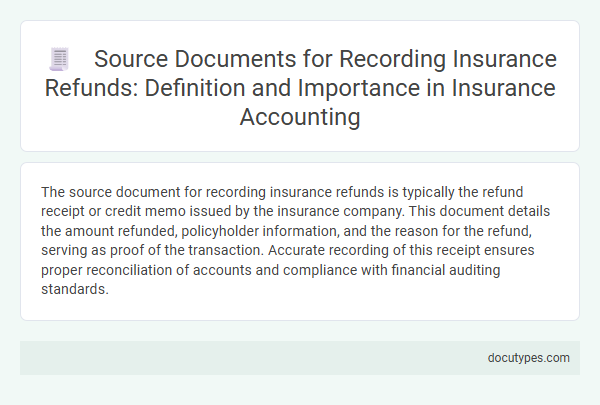The source document for recording insurance refunds is typically the refund receipt or credit memo issued by the insurance company. This document details the amount refunded, policyholder information, and the reason for the refund, serving as proof of the transaction. Accurate recording of this receipt ensures proper reconciliation of accounts and compliance with financial auditing standards.
Introduction to Insurance Refunds
Insurance refunds occur when a policyholder receives a repayment due to overpaid premiums or policy cancellations. Accurate documentation is essential for proper recording and verification of these refunds.
- Insurance Refund Receipt - The primary source document that confirms the amount refunded to the policyholder.
- Refund Authorization Form - A formal document authorizing the refund transaction between the insurer and the insured.
- Payment Voucher - A record that details the payment method and transaction date for the insurance refund.
Understanding Source Documents in Insurance
What is the source document for recording insurance refunds? The primary source document for recording insurance refunds is the refund receipt or refund check issued by the insurance company. This document provides official proof of the refund transaction and details necessary for accurate accounting and record-keeping.
Definition of Insurance Refund Source Documents
| Definition | An insurance refund source document is the original paperwork used to record reimbursement or return of premiums from an insurance company. |
|---|---|
| Purpose | To provide verifiable evidence for accounting entries related to insurance refunds or adjustments. |
| Common Types | Premium refund notices, credit memos, adjustment letters, and official insurer correspondence. |
| Importance | These documents ensure accurate financial tracking and compliance with audit requirements. |
| Usage | You should retain these source documents when recording insurance refunds in your accounting records to maintain transparency and accuracy. |
Types of Source Documents Used for Insurance Refunds
Source documents for recording insurance refunds are essential for accurate financial tracking and compliance. Common types include refund check stubs, electronic remittance advices, and credit memos from insurance companies. You should retain these documents to ensure proper documentation and facilitate smooth refund processing.
Importance of Source Documents in Insurance Accounting
Source documents are essential for accurately recording insurance refunds and ensuring proper financial tracking. These documents provide verified evidence that supports refund transactions in insurance accounting.
- Proof of Transaction - Source documents like refund receipts or adjustment notices validate the refund amount and date.
- Audit Trail - They create an audit trail for compliance with insurance regulations and internal controls.
- Accuracy and Transparency - Using source documents improves the accuracy and transparency of your insurance refund records.
Role of Source Documents in Financial Accuracy
Source documents for recording insurance refunds serve as the primary evidence verifying the transaction. Common examples include refund receipts, credit memos, and adjustment notes issued by the insurance provider.
These documents play a critical role in maintaining financial accuracy by ensuring all refund entries are supported by legitimate proof. Accurate source documentation helps prevent errors, discrepancies, and potential fraud in financial records. Properly recorded refunds also facilitate clear audit trails and compliance with accounting standards.
Common Examples of Insurance Refund Source Documents
The source document for recording insurance refunds is crucial for accurate financial tracking and audit purposes. Common examples of insurance refund source documents include refund checks issued by the insurance company, electronic remittance advices (ERAs), and credit memos. These documents provide detailed information about the refund amount, policyholder details, and transaction date, facilitating proper recording in accounting systems.
Procedures for Recording Insurance Refunds
The source document for recording insurance refunds is the insurance refund statement provided by the insurance company. This document serves as official proof of the refund transaction and details the amount returned.
- Insurance Refund Statement - A formal document issued by the insurer specifying the refund amount and reference details.
- Verification Process - Ensures that the refund matches the recorded transaction and policy terms.
- Accounting Entry - Uses the refund statement as the basis to update your financial records accurately.
Maintaining accurate source documents like insurance refund statements is essential for proper financial tracking and audit compliance.
Audit and Compliance Considerations for Refunds
The source document for recording insurance refunds is typically the insurance refund voucher or credit memo issued by the insurer. This document provides the necessary details such as the refund amount, policy number, and date of the refund transaction.
Audit and compliance considerations for refunds require maintaining these source documents to ensure accurate financial records and adherence to regulatory standards. Proper documentation helps verify the legitimacy of refunds and supports transparent financial reporting.
What Is the Source Document for Recording Insurance Refunds? Infographic

